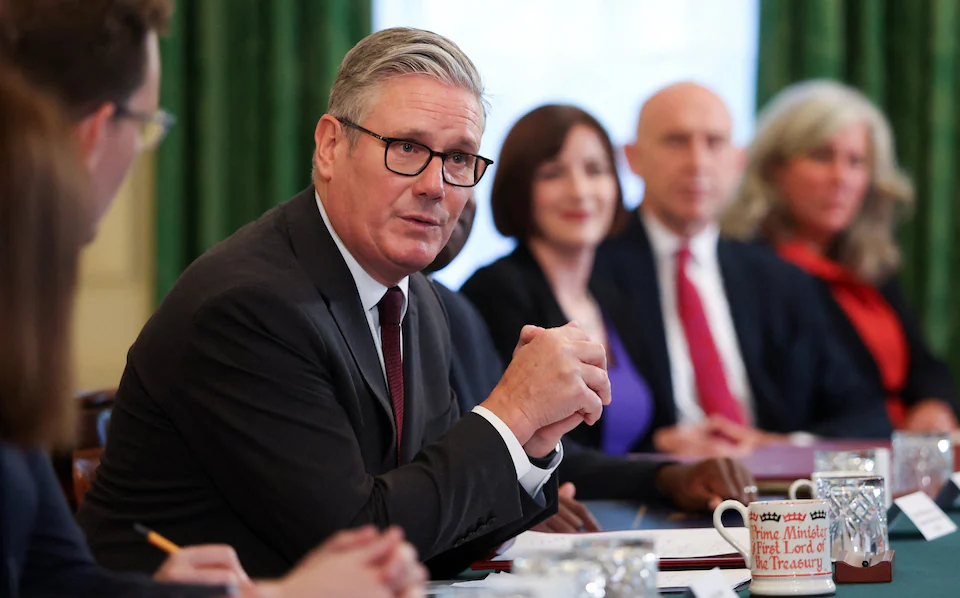Britain is set to endure the weakest growth in living standards of any major Western economy, the International Monetary Fund (IMF) has warned, as stubbornly high inflation and a slowing economy weigh heavily on household incomes.
In its latest World Economic Outlook, the IMF forecast that UK growth per person, a key measure of living standards would rise by just 0.5 per cent in 2026, compared with 1.8 per cent in the United States and 1.2 per cent in Japan. The eurozone is also expected to outpace Britain, posting growth of 0.9 per cent per head.
Living standards under strain
GDP per head has fallen in the UK for the past two years, as the country’s surging population, driven by record immigration ; has expanded faster than the economy itself. Economists often use GDP per capita as a benchmark for national prosperity, and the figures suggest Britons are getting poorer relative to their global peers.
The Fund trimmed its overall forecast for UK growth next year, warning that a new trade deal with the United States would fail to offset the drag from higher tariffs imposed by President Donald Trump. It also highlighted that Britain’s prices are rising faster than in some developing nations such as Peru and Senegal, citing higher taxes and surging household bills.
The UK is now expected to suffer the highest inflation in the G7 over the next two years , a trend that the IMF says will erode any gains in real wages or disposable income.
Inflation stubbornly high
The IMF expects UK consumer prices to rise by an average 3.4 per cent in 2025, easing to 2.5 per cent in 2026, before falling back to the Bank of England’s 2 per cent target toward the end of next year.
That compares with much lower projected inflation in the US, where Trump’s tariffs have not significantly fuelled domestic price pressures.
Alarmingly, Britain’s inflation rate is forecast to remain above that of several smaller and emerging economies — including Morocco, Ivory Coast, Saudi Arabia, Oman, and Peru.
Pierre-Olivier Gourinchas, the IMF’s chief economist, warned that above-target inflation risks becoming “entrenched” in the UK. “One has to be very careful,” he said. “It is important to ensure that this increase in inflation, which we assess to be temporary, really turns out to be temporary.”
Official figures this week showed that the UK labour market continues to weaken, with unemployment hitting a four-year high. The Resolution Foundation said real weekly wages had risen by just £1.50 since last September — leaving the typical worker little better off than a year ago.
The combination of rising prices, higher taxes, and slowing pay growth has left many households under mounting financial pressure.
The IMF noted that Britain’s cumulative growth over the next two years will be much lower than projected in October 2024, just before Chancellor Rachel Reeves launched her record £40bn tax package.
While the Fund upgraded its forecast for 2025 slightly to 1.3 per cent, it downgraded 2026 growth by 0.1 percentage point, warning that further tax rises expected in November’s Budget could stifle the recovery.
The IMF also sounded the alarm over rising government borrowing costs, warning that the UK’s long-term bond yields now exceed those in both the US and the eurozone. With annual debt interest payments exceeding £100bn — double the defence budget — economists fear Britain risks being drawn into a “doom loop” of higher borrowing, lower growth, and rising taxes.
“In light of the recent surge in long-term sovereign bond yields, abrupt market reactions to fiscal vulnerabilities could have an amplified impact,” the Fund cautioned.
Reeves vows to ‘get Britain growing’
Chancellor Reeves welcomed the IMF’s second consecutive upgrade to this year’s forecast, saying the economy was showing “early signs of resilience.”
“This is the second consecutive upgrade to this year’s growth forecast from the IMF,” she said. “It’s no surprise Britain led the G7 in growth in the first half of this year, and average disposable income is up £800 since the election. But for too many people, our economy feels stuck , and I’m going to deal with it.”
However, she admitted that the UK still faced “serious challenges” after 15 years of weak productivity and high debt. “Growth and productivity figures have consistently come in lower than expected,” she told the Cabinet, adding that high borrowing costs were constraining public spending.
Ahead of the Budget on November 26, Reeves is attempting to persuade the Office for Budget Responsibility (OBR) that major planning reforms and trade deals with the US, India and the EU can help boost medium-term growth.
Read Also:
UK to introduce new law implementing Troubles legacy deal with Ireland
UK Teacher banned for life after smacking pupil with ruler
Starmer arrives Egypt for Gaza peace summit as ceasefire holds
Opposition figures accused the government of complacency. Sir Mel Stride, the Shadow Chancellor, said the IMF’s projections “make for grim reading.”
“Inflation in the UK is now set to be the highest in the G7 this year and next — rising faster than expected because of the choices Rachel Reeves has made,” he said.
The Fund also suggested that recent gains in inflation could prove temporary, but warned of “upside risks” if labour costs continue to climb and long-term inflation expectations rise. The Bank of England’s latest survey showed Britons now expect prices to grow 3.6 per cent over the next year, up from 3.2 per cent in May.
Meanwhile, economists warned that some of the UK’s post-2008 productivity losses appear permanent, threatening to blow a £30bn hole in public finances and force new tax rises.
With inflation stubborn, debt high, and productivity stagnant, the IMF’s message was clear: the UK risks slipping further behind its global peers — and living standards could take years to recover.



